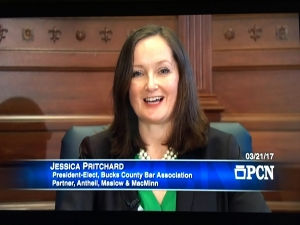Antheil Maslow & MacMinn to Sponsor Pearl S. Buck Woman of Influence Award Dinner
Antheil Maslow & MacMinn is proud to be a sponsor of the Pearl S. Buck Woman of Influence Award dinner and ceremony on Thursday, May 4, 2017. The Woman of Influence Award recognizes a woman who, like Pearl S. Buck, has distinguished herself in devotion to family, career and humanitarian causes. This year, the award honors Pamela Varkony, a dynamic teacher, speaker, freelance columnist and author who inspires audiences around the globe through her passion for improving the lives of others.
Susan Maslow, a founder of the firm, serves on the event committee for Pearl S. Buck International, an organization that provides opportunities to explore and appreciate other cultures, builds better lives for children around the globe and promotes the legacy of Pearl S. Buck by preserving her National Historic Landmark home.
Ms. Maslow is a business attorney who concentrates her practice primarily in general corporate transactional work and finance documentation in the areas of business transactions, private finance, real estate, contracts, and non-profit law. She is a member of ABA Subcommittee of the Business Law Section Drafting Human Rights Protections in Supply Contracts
Jessica Pritchard Serves as Case Commentator for Superior Court PCN En Banc Coverage
On March 30th, Jessica A. Pritchard, a Partner of Antheil Maslow & MacMinn, LLP and President-Elect Bucks County Bar Association appeared on Pennsylvania Cable Network ("PCN") providing commentary on the Superior Court of Pennsylvania’s en banc session. En banc sessions are cases heard before a larger panel of the Superior Court (normally a three judge panel). Not all requests for a rehearing en banc are granted. Often, an appeals court will not take the time to rehear a case en banc unless the case includes a question of major importance (like how to interpret a new law), or the smaller panel’s opinion appears to contradict state law or precedent. The cases were originally presented before the en banc panel on March 21, 2017. Ms. Pritchard was selected as a case commentator to provide viewers with relevant background information pertaining to each case. The commentators enhance the educational aspect of the coverage by making the process more accessible to viewers.
Ms. Pritchard focuses her practice exclusively in the area of family law, where she handles all phases of the negotiation and litigation of domestic relations cases, including divorce, child custody, child support, alimony/spousal support, equitable distribution, and prenuptial and postnuptial agreements.
Elizabeth Fineman Teaches Family Law Seminar
Elizabeth Fineman will be a panelist at an April 6th Strafford Live webinar, "Divorce Cases: Uncovering Critical Information in Tax Returns and Financial Statements". The panel will focus on appropriate discovery methods to obtain information, explain how to get the most out of your analysis of tax returns and financial documents, and outline best approaches for using financial experts.
Elizabeth concentrates her practice on domestic relations matters and handles a variety of issues, including divorce, child support, alimony/spousal support, marital taxation, equitable distribution and child custody matters. She has handled many high-income support cases involving an intricate knowledge of both family law and complex financial issues. Additionally, Elizabeth has handled several appellate court matters representing her clients’ interests in the Superior Court of Pennsylvania.
Antheil Maslow & MacMinn's Founders Celebrate 25th Anniversary
Bill Antheil, Sue Maslow & Bill MacMinn enjoyed a commemorative cake with the firm on March 1st to mark 25 Years since the firm's establishment.
25th Anniversary
Jessica Pritchard Elected Vice President of BCBA
Antheil Maslow & MacMinn is pleased to announce that Partner Jessica Pritchard has been elected to serve as Vice President/President Elect of the Bucks County Bar Association. The Bucks County Bar Association, one of the oldest and most active bar associations in the United States, has over 800 members and is dedicated to providing support and fellowship for the advancement of the legal profession. Ms. Pritchard has been an active member of the Association and has served in a variety of leadership roles, including as Board Secretary, Board member, as well as chair of the Family Law Section.
Jessica Pritchard chairs the firm’s family law department. Her practice focuses exclusively in the area of family law, where she handles all phases of the negotiation and litigation of domestic relations cases, including divorce, child custody, child support, alimony/spousal support, equitable distribution, and prenuptial and postnuptial agreements.
Celebrating over 25 years in business, Antheil Maslow & MacMinn, LLP is a full-service law firm that offers sophisticated, proactive, timely and cost-effective legal advice. The Firm has a broad range of practice areas in Business & Finance; Family Law, Death & Serious Injury; Estates & Trusts; Health Care; Labor & Employment; Litigation; Nonprofits; Real Estate & Land Use; Tax; and Bankruptcy. The Firm works with high net worth individuals, small to mid-sized, privately-held companies, nonprofits and health care organizations in the Greater Philadelphia and New Jersey areas. Antheil Maslow & MacMinn, LLP is headquartered in Doylestown, Pennsylvania with a branch office in Princeton, New Jersey.
Patricia Collins Instructs at HR Bootcamp
On November 17th, Patricia Collins, Esquire, a Partner with Antheil Maslow & MacMinn, LLP in Doylestown, will participate as an instructor at McCloskey Partners’ Crash Course - HR BOOTCAMP held from 9:00 AM – 3:00 PM at Stay Bridge Suites in Montgomeryville. The program covers areas including: FLSA requirements, recruiting and hiring, managing within the law, the importance of the HR audit, documenting, disciplining, delegating and termination of employees, Workers Compensation, the importance of the HR Audit, communication / conflict resolution, benefits basics, social media policies, and many other important topics for employers.
Heather McCloskey will moderate this training event designed specifically for small-to-medium sized companies. In attendance will be business owners, professionals who handle HR as one of their varied responsibilities, entry-level HR employees and managers that in addition to their other tasks handle HR as well.
Participants may register by contacting denise@mccloskeypartners.com or 215-716-3035 x 700.
Patty Collins Speaks on New DOL Overtime Regulations
Patty Collins was joined by Cindy Bergvall, CPA at a seminar for local non-profit and for profit employers regarding new Department of Labor overtime regulations slated to take effect December 1st.
Arbitration
Most family law matters are resolved by agreement or through the court system. However, there are also alternative options, referred to as alternative dispute resolution, to settlement or court. Arbitration is one such option. If the parties agree to arbitrate their case, or a part of their case, they retain an arbitrator who they pay to hear and decide their case. The parties will still reach retain their own attorneys as the arbitrator acts as the decision maker and does not provide the parties with legal advice and guidance. The arbitrator is often an experienced family law attorney.
The parties’ sign an agreement with the arbitrator and through this agree that they will be bound by the arbitrator’s decision. The parties can determine if the arbitrator will decide all aspects of their case (such as equitable distribution, alimony and attorney’s fees) or more limited (such as division of personal property). The arbitrator is often involved in preliminary matters such as setting deadlines for discovery and a timeline for the arbitration process. Prior to the arbitration the parties, through their attorneys, provided detailed briefs to the arbitrator along with all of the documents that they want the arbitrator to consider. The arbitrator reviews everything in advance of the arbitration. At the arbitration the arbitrator has the opportunity to ask questions of the attorneys, parties and experts (if any) so that the arbitrator has all information to make a decision. The arbitrator, following the conclusion of the arbitration, issues a written decision which is often then entered by stipulation as an order of court.
Alimony
Alimony is support payments made from one spouse to the other spouse after the entry of the Divorce Decree. If an award of alimony is to be entered, it must be entered prior to the Divorce Decree being signed by the Judge. Therefore, one party usually raises a claim for alimony when they file or answer the Divorce Complaint.
In determining if an award of alimony is appropriate, as well as the length of the award and the monthly amount, the court considers a list of factors which are in the Divorce Code. The factors are as follows:
• The relative earnings and earning capacities of the parties.
• The ages and the physical, mental and emotional conditions of the parties.
• The sources of income of both parties, including, but not limited to, medical, retirement, insurance or other benefits.
• The expectancies and inheritances of the parties.
• The duration of the marriage.
• The contribution by one party to the education, training or increased earning power of the other party.
• The extent to which the earning power, expenses or financial obligations of a party will be affected by reason of serving as the custodian of a minor child.
• The standard of living of the parties established during the marriage.
• The relative education of the parties and the time necessary to acquire sufficient education or training to enable the party seeking alimony to find appropriate employment.
• The relative assets and liabilities of the parties.
• The property brought to the marriage by either party.
• The contribution of a spouse as homemaker.
• The marital misconduct of either of the parties during the marriage. The marital misconduct of either of the parties from the date of final separation shall not be considered by the court in its determinations relative to alimony, except that the court shall consider the abuse of one party by the other party.
• Whether the party seeking alimony lacks sufficient property, including, but not limited to, property distributed under Chapter 35 (relating to property rights), to provide for the party's reasonable needs.
• Whether the party seeking alimony is incapable of self-support through appropriate employment.
While the court must consider all factors, it can weigh each factor differently. Alimony is intended as a secondary remedy if, in the court’s opinion, an equitable resolution cannot be reached through equitable distribution alone. If alimony is awarded, the court will determine how many years the alimony will be paid and the monthly alimony amount. Alimony is taxable to the recipient and tax deductible to the payor. This is because alimony is treated as an income stream to the recipient.








